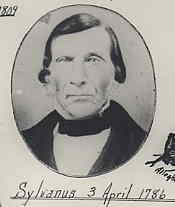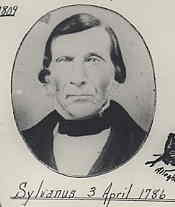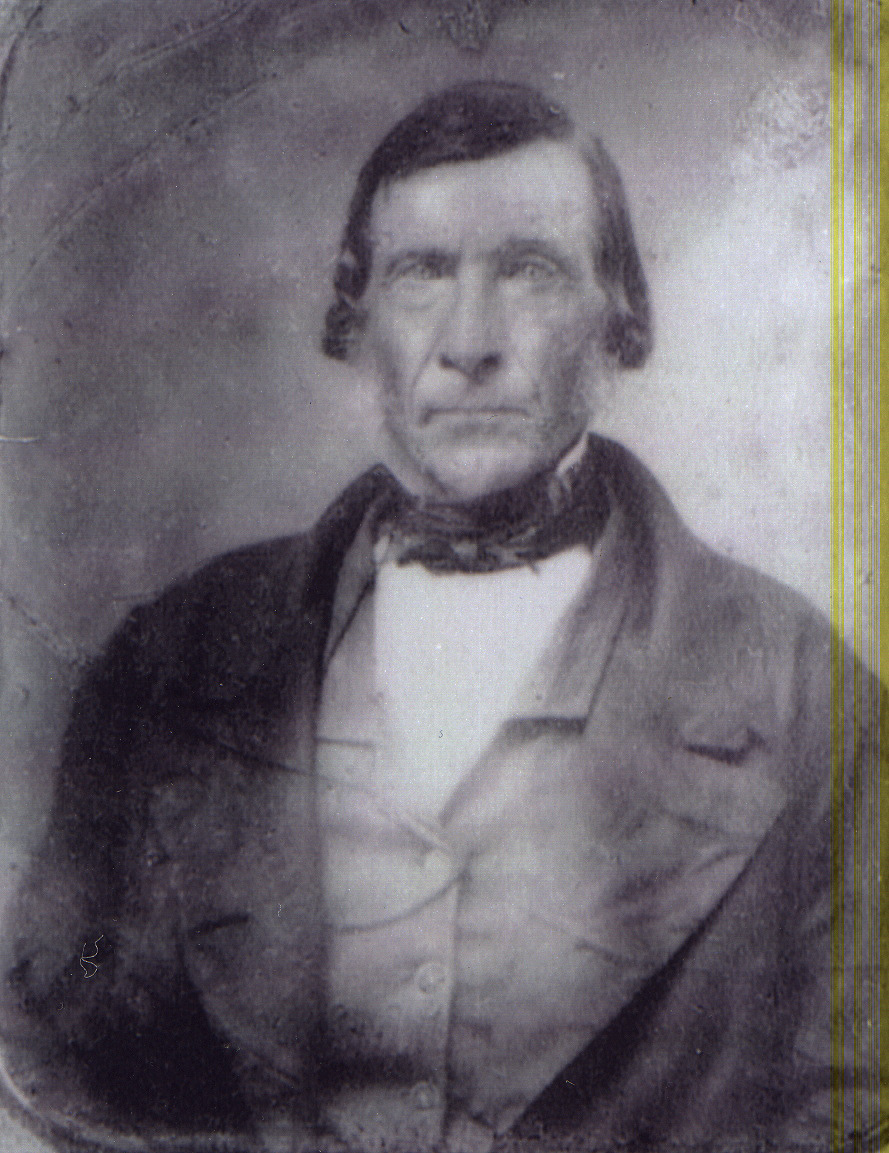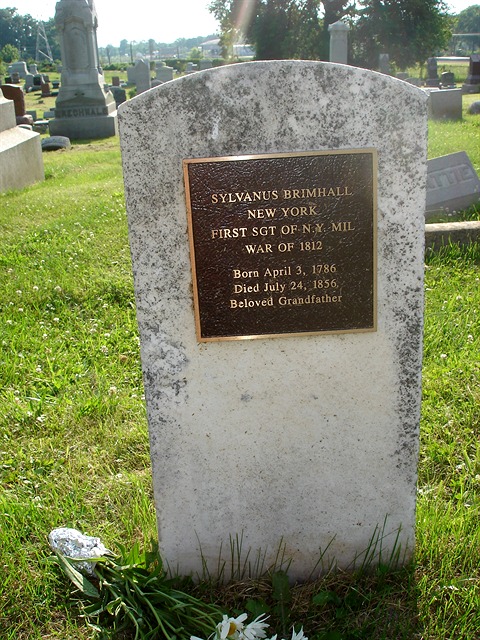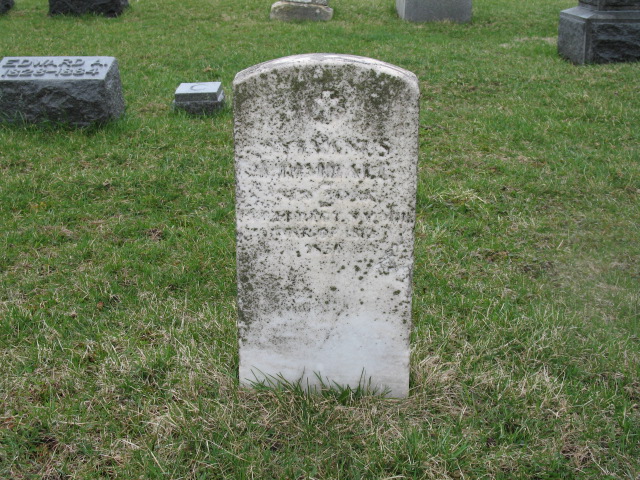It is not known how Sylvanus earned his living while at Watertown and South Trenton, New York. We do know a son Horace Johnson was born April 3, 1809 and two daughters: Nancy on May 5, 1811 and Mary on November 9, 1812 at Watertown, Jefferson, New York. The family then moved to South Trenton, Oneida County, New York where George Washington was born November 14, 1814, and then back to Watertown where Tryphena was born March 5,1816. Sometime between 1816 and 1819 the family moved to Steuben County somewhere on the Conhocton River where it is believed Samuel was born on January 5, 1819. George Washington in his personal history on this date, states his father went to lumbering for a living. Sylvanus was away a great deal of time. The country was cold and frosty with little being raised but cabbages and potatoes. There was an abundance of wild fruits. The family moved to Olean Point where they spent one winter and Norman Guitteau, a son, was born November 4,1820. In the spring the family moved to Millville on the Oswao Creek which empties into the Allegany River. Sylvanus rented a sawmill and was furnished with logs of very fine quality to cut into lumber which sold for $6. per thousand and shaved shingles, a dollar apiece. Food was terribly expensive because it all had to be shipped from Pittsburgh in large canoes 500 miles against a swift current with ropes, pike poles and the muscular strength of man through Indian country (the six nations of Algonquins). Sylvanus was a very large, heavy, raw-boned man weighing over 200 pounds, a rugged man in a rugged country with nerves of steel. He was stern yet tender and merciful with a courageous heart and an adventurous spirit. Sylvanus always tried to provide and care for his loving wife and children. Necessity being the mother of invention, Sylvanus had the blacksmith make a four tined spear with barbs, which he fastened onto a handle about twelve feet long. Then fixing a platform across the skiff, which they covered with dirt, and taking his two sons, one to steer and the other to tend the fire (their only light), they went fishing at night. The spear worked fine and the expedition was successful as well as hazardous. They returned with several fish weighing 20 pounds or so. That winter there were several cougars or panthers killed near their home. They had a milk cow and survived better than usual. Sylvanus, a man of principle always standing for what is right, impressed his young family by admonishing two "mountain men" neighbors for mis-using his borrowed milk pail. The one neighbor sent the family some deer meat following the incident. Sylvanus, another boy, was born September 24,1822. That winter was very hard, the mill froze up and little could be done, except packing lumber below the mill ready for rafting in the spring. By spring Sylvanus had about thirty thousand feet of lumber and as many shaved shingles. The family spent the winter pouring over a new book Sylvanus brought home entitled "Morsels Geography" describing Ohio, Indiana, Virginia and Kentucky. Lydia and Sylvanus had long dreamed of going west. In March 1824 the ice on the river broke up and Sylvanus rafted his lumber in four tiered sections, placing the bunches of shingles nearly on the outer edge of the raft for bulwarks, then making a garret roof on two sections for a house, he took all their belongings aboard, along with his family, and set the raft in motion down the Allegany River. The raft was nearly 80 feet long and at one end of the raft was placed a powerful steering apparatus and a pilot was hired to help steer the raft over the falls and the rapids. The mother and the girls and the two younger boys walked around the falls. The older boys helped Sylvanus and the pilot with the two additional men needed to lower the raft, on down the Allegany past the old Fort Diem, Quesna and then Pittsburgh, the junction of the Monongahela and Allegany Rivers. The family stopped long enough to sell the shingles to meet expenses and secure supplies. Then on into the beautiful Ohio River. The trip was not without its excitement as they almost lost Tryphena overboard. On past Cincinnati and after travelling well over 1500 miles, the family landed at Lawrenceburg, Dearborne County, Indiana. Sylvanus rented a house and the family moved in. Every board on the raft had to be cleaned and scoured with brooms then piled up to dry. The family then moved out of town about 12 miles where they stayed for almost a year while Sylvanus took the lumber to New Orleans to be sold.
Another son, John was born here March 16, 1824. When Sylvanus returned he bought a quarter section of heavy timbered land in Manchester, Wabash County, Indiana where the family lived for ten years. The family cleared the land, built fences, etc., and built a home, which promised everything necessary for man, producing everything useful for man from the blacksmith, wheelwright, professor and historian. George Washington states, "Also from that home of 'Enoch Sylvanus' has sprung the tentmaker, and such as have cattle, the organ maker and musician as well as the artificer in brass and iron and the handling of the distaff and making of cloth of the most beautiful design". The family was happy here and grew to adulthood with a firm belief in a Supreme Being, a love of country and a know-how to survive. Here a son Noah was born on February 8, 1826 so named for the river trip on the raft. Their eleventh child Andrew Jackson was born December 28,1827. The family prospered and Lydia and Sylvanus were able to travel back east to see their relatives in approximately 1834. The girls had married and Horace was working on a canal in Ohio and George W. was out surveying Indian Country. It was at this time young Noah went to stay with his sister and her husband, Thalma Noyes. The whereabouts of the others is unknown. In 1837 or 1838 Nancy's husband died and she returned home with Noah and her own young children.
It was at this time that the adventurous spirit again beckoned and Syivanus and his son George W. set out on one horse traveling to Fort Wayne, Indiana then to Fort Defiance, Michigan and then taking the old soldiers trail to Chicago, While passing through Pleasant Grove, Henry County, Illinois, Sylvanus bought out some squatters at $1.25 per acre. The family moved to Pleasant Grove where Lydia became ill and died August 10, 1843. She was buried on the old farm at Pleasant Grove, but when the railroad came through she was moved to Corral(Coral) or Maringo(Marengo), Illinois. The missionaries for the L.D.S. Church had preached one sermon to her prior to her death. Mary, who was now Mary Crocker, lived at Galesburg where Sylvanus died at the age of 70 years, 3 and 20 on July 24,1856. Three sons, George Washington, Noah, and John joined the L.D.S. Church. It is also believed that Norman also joined the Church based on his coming to Utah with the others and that under the direction of Brigham Young helped make a treaty with the Indians. Samuel became a Preacher, Andrew Jackson a Methodist Preacher, preaching once in Ogden, Utah in 1884. John was part of the Mormon Battalion, but took ill and was sent back with the sick detachment.
Norman was the blacksmith at Richfield, Utah, All of the children were taught to read and write at home by the fire of the kitchen stove and at the knees of loving parents. They attended the higher white living at Manchester. Joseph Cutter, the husband of Tryphena Brimhall, was a Sergeant of the Color Guard, Minnesota Regiment and was killed in the Civil War. George Washington Brimhall re-dedicated his father's grave on or about January 2,1890; the following is a portion of his letter. "January 2, 1890, about three weeks ago, I landed at Galesburg, Illinois my sister Mary Crocker's and had a very bad ear ache. It cost me $10 to get it well again." "I have seen my son, Rufus and my daughter Mary, They all received me with Joy being absent 40 years or so." "Today my brother Samuel's son and wife Mary came to me from Rosetta, Henderson County, Illinois
It is not known how Sylvanus earned his living while at Watertown and South Trenton, New York. We do know a son Horace Johnson was born April 3, 1809 and two daughters: Nancy on May 5, 1811 and Mary on November 9, 1812 at Watertown, Jefferson, New York. The family then moved to South Trenton, Oneida County, New York where George Washington was born November 14, 1814, and then back to Watertown where Tryphena was born March 5,1816. Sometime between 1816 and 1819 the family moved to Steuben County somewhere on the Conhocton River where it is believed Samuel was born on January 5, 1819. George Washington in his personal history on this date, states his father went to lumbering for a living. Sylvanus was away a great deal of time. The country was cold and frosty with little being raised but cabbages and potatoes. There was an abundance of wild fruits. The family moved to Olean Point where they spent one winter and Norman Guitteau, a son, was born November 4,1820. In the spring the family moved to Millville on the Oswao Creek which empties into the Allegany River. Sylvanus rented a sawmill and was furnished with logs of very fine quality to cut into lumber which sold for $6. per thousand and shaved shingles, a dollar apiece. Food was terribly expensive because it all had to be shipped from Pittsburgh in large canoes 500 miles against a swift current with ropes, pike poles and the muscular strength of man through Indian country (the six nations of Algonquins). Sylvanus was a very large, heavy, raw-boned man weighing over 200 pounds, a rugged man in a rugged country with nerves of steel. He was stern yet tender and merciful with a courageous heart and an adventurous spirit. Sylvanus always tried to provide and care for his loving wife and children. Necessity being the mother of invention, Sylvanus had the blacksmith make a four tined spear with barbs, which he fastened onto a handle about twelve feet long. Then fixing a platform across the skiff, which they covered with dirt, and taking his two sons, one to steer and the other to tend the fire (their only light), they went fishing at night. The spear worked fine and the expedition was successful as well as hazardous. They returned with several fish weighing 20 pounds or so. That winter there were several cougars or panthers killed near their home. They had a milk cow and survived better than usual. Sylvanus, a man of principle always standing for what is right, impressed his young family by admonishing two "mountain men" neighbors for mis-using his borrowed milk pail. The one neighbor sent the family some deer meat following the incident. Sylvanus, another boy, was born September 24,1822. That winter was very hard, the mill froze up and little could be done, except packing lumber below the mill ready for rafting in the spring. By spring Sylvanus had about thirty thousand feet of lumber and as many shaved shingles. The family spent the winter pouring over a new book Sylvanus brought home entitled "Morsels Geography" describing Ohio, Indiana, Virginia and Kentucky. Lydia and Sylvanus had long dreamed of going west. In March 1824 the ice on the river broke up and Sylvanus rafted his lumber in four tiered sections, placing the bunches of shingles nearly on the outer edge of the raft for bulwarks, then making a garret roof on two sections for a house, he took all their belongings aboard, along with his family, and set the raft in motion down the Allegany River. The raft was nearly 80 feet long and at one end of the raft was placed a powerful steering apparatus and a pilot was hired to help steer the raft over the falls and the rapids. The mother and the girls and the two younger boys walked around the falls. The older boys helped Sylvanus and the pilot with the two additional men needed to lower the raft, on down the Allegany past the old Fort Diem, Quesna and then Pittsburgh, the junction of the Monongahela and Allegany Rivers. The family stopped long enough to sell the shingles to meet expenses and secure supplies. Then on into the beautiful Ohio River. The trip was not without its excitement as they almost lost Tryphena overboard. On past Cincinnati and after travelling well over 1500 miles, the family landed at Lawrenceburg, Dearborne County, Indiana. Sylvanus rented a house and the family moved in. Every board on the raft had to be cleaned and scoured with brooms then piled up to dry. The family then moved out of town about 12 miles where they stayed for almost a year while Sylvanus took the lumber to New Orleans to be sold.
Another son, John was born here March 16, 1824. When Sylvanus returned he bought a quarter section of heavy timbered land in Manchester, Wabash County, Indiana where the family lived for ten years. The family cleared the land, built fences, etc., and built a home, which promised everything necessary for man, producing everything useful for man from the blacksmith, wheelwright, professor and historian. George Washington states, "Also from that home of 'Enoch Sylvanus' has sprung the tentmaker, and such as have cattle, the organ maker and musician as well as the artificer in brass and iron and the handling of the distaff and making of cloth of the most beautiful design". The family was happy here and grew to adulthood with a firm belief in a Supreme Being, a love of country and a know-how to survive. Here a son Noah was born on February 8, 1826 so named for the river trip on the raft. Their eleventh child Andrew Jackson was born December 28,1827. The family prospered and Lydia and Sylvanus were able to travel back east to see their relatives in approximately 1834. The girls had married and Horace was working on a canal in Ohio and George W. was out surveying Indian Country. It was at this time young Noah went to stay with his sister and her husband, Thalma Noyes. The whereabouts of the others is unknown. In 1837 or 1838 Nancy's husband died and she returned home with Noah and her own young children.
It was at this time that the adventurous spirit again beckoned and Syivanus and his son George W. set out on one horse traveling to Fort Wayne, Indiana then to Fort Defiance, Michigan and then taking the old soldiers trail to Chicago, While passing through Pleasant Grove, Henry County, Illinois, Sylvanus bought out some squatters at $1.25 per acre. The family moved to Pleasant Grove where Lydia became ill and died August 10, 1843. She was buried on the old farm at Pleasant Grove, but when the railroad came through she was moved to Corral(Coral) or Maringo(Marengo), Illinois. The missionaries for the L.D.S. Church had preached one sermon to her prior to her death. Mary, who was now Mary Crocker, lived at Galesburg where Sylvanus died at the age of 70 years, 3 and 20 on July 24,1856. Three sons, George Washington, Noah, and John joined the L.D.S. Church. It is also believed that Norman also joined the Church based on his coming to Utah with the others and that under the direction of Brigham Young helped make a treaty with the Indians. Samuel became a Preacher, Andrew Jackson a Methodist Preacher, preaching once in Ogden, Utah in 1884. John was part of the Mormon Battalion, but took ill and was sent back with the sick detachment.
Norman was the blacksmith at Richfield, Utah, All of the children were taught to read and write at home by the fire of the kitchen stove and at the knees of loving parents. They attended the higher white living at Manchester. Joseph Cutter, the husband of Tryphena Brimhall, was a Sergeant of the Color Guard, Minnesota Regiment and was killed in the Civil War. George Washington Brimhall re-dedicated his father's grave on or about January 2,1890; the following is a portion of his letter. "January 2, 1890, about three weeks ago, I landed at Galesburg, Illinois my sister Mary Crocker's and had a very bad ear ache. It cost me $10 to get it well again." "I have seen my son, Rufus and my daughter Mary, They all received me with Joy being absent 40 years or so." "Today my brother Samuel's son and wife Mary came to me from Rosetta, Henderson County, Illinois
Inscription
SYLVANUS BRIMHALL
New York
Beloved Grandfather, War of 1812
Family Members
-
![]()
Horace Johnson Brimhall
1810–1882
-
![]()
Nancy Brimhall Noyes
1811–1860
-
![]()
Mary Brimhall Crocker
1812–1902
-
![]()
George Washington Brimhall
1814–1895
-
![]()
Mrs Tryphena Brimhall Colter
1816–1869
-
![]()
Rev Samuel Brimhall
1819–1888
-
![]()
Norman Guitteau Brimhall
1820–1907
-
![]()
Sylvanus Brimhall
1822–1907
-
![]()
Pvt John Brimhall
1824–1906
-
![]()
Noah Brimhall
1826–1918
Advertisement
Records on Ancestry
Sponsored by Ancestry
Advertisement
